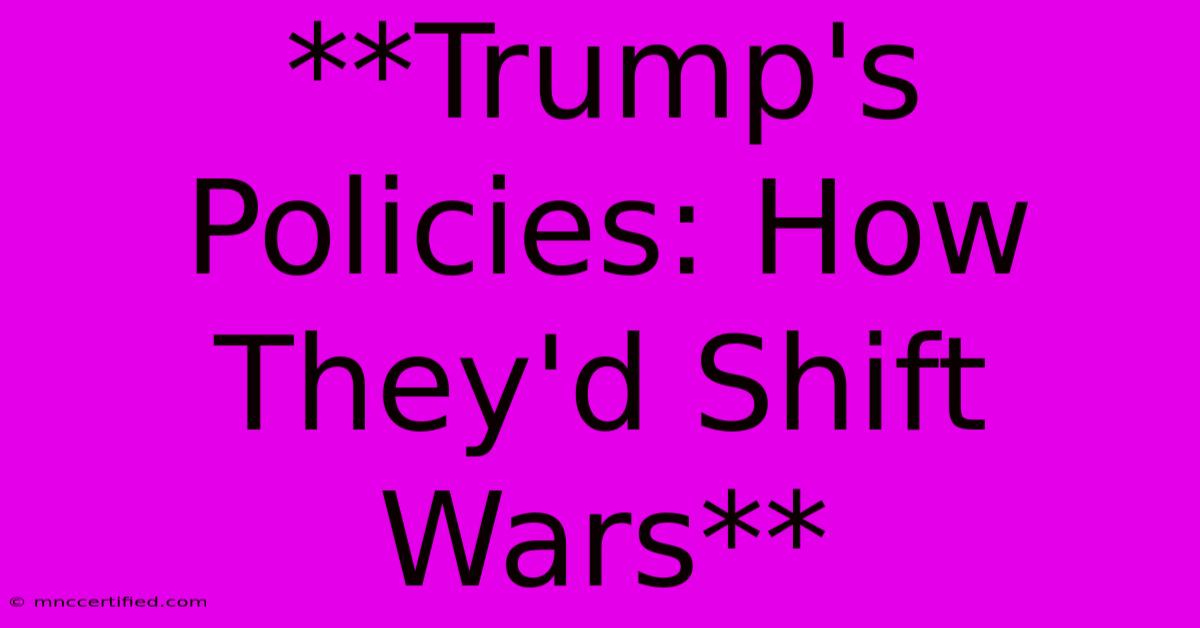**Trump's Policies: How They'd Shift Wars**

Table of Contents
Trump's Policies: How They'd Shift Wars
Donald Trump's presidency was marked by a distinct foreign policy approach, often characterized by "America First" nationalism and a willingness to challenge the status quo. This approach extended to the realm of war and conflict, leading to both significant changes and lingering uncertainties.
A Shift Towards Isolationism?
Trump's campaign rhetoric promised to "end endless wars" and reduce US involvement in foreign conflicts. While he did withdraw troops from Syria and Afghanistan, his actions were often criticized for being reactive rather than proactive. He also pursued an "America First" policy, seeking to renegotiate trade deals and prioritize domestic interests over global alliances. This approach was seen by some as a retreat from the traditional US role as a global leader, potentially weakening its ability to influence and deter conflict.
Embracing Bilateralism Over Multilateralism
Trump consistently favored bilateral agreements over multilateral ones, pulling the US out of the Trans-Pacific Partnership and the Paris Climate Accord. This approach extended to security issues, where he often bypassed established international organizations like NATO in favor of direct deals with individual countries. While some argued that this offered greater flexibility and allowed for more targeted negotiations, others criticized it for undermining the global order and weakening international cooperation.
The "Art of the Deal" in War?
Trump's style of diplomacy often relied on negotiation and deal-making, seeking to leverage pressure and leverage to achieve desired outcomes. This was evident in his interactions with North Korea, where he engaged in a series of high-profile summits with Kim Jong-un, seeking to denuclearize the Korean peninsula. While some saw this as a promising opportunity to resolve a long-standing conflict, others questioned the effectiveness of this approach and the potential for unintended consequences.
Impact on the Global Security Landscape
Trump's policies undoubtedly had a significant impact on the global security landscape. His withdrawal from the Iran nuclear deal, the imposition of tariffs on Chinese goods, and his rhetoric towards NATO allies all contributed to an atmosphere of uncertainty and unpredictability. The question of whether these changes will ultimately contribute to more peace or greater conflict remains a subject of ongoing debate.
The Legacy of Trump's War Policies
While Trump's presidency ended with the end of his term, the impact of his policies continues to resonate. The legacy of his "America First" approach, his emphasis on bilateralism, and his unconventional negotiation tactics will likely continue to shape the future of US foreign policy and its role in the global arena.
Conclusion
Trump's policies regarding war and conflict were multifaceted, encompassing both a desire to reduce US involvement and a willingness to engage in direct negotiations and pressure tactics. While his approach led to significant changes in the global security landscape, the long-term consequences remain uncertain. The debate over the legacy of Trump's war policies will continue, with scholars and policymakers alike grappling with the complexities of his "America First" vision and its implications for the future of global peace and security.

Thank you for visiting our website wich cover about **Trump's Policies: How They'd Shift Wars**. We hope the information provided has been useful to you. Feel free to contact us if you have any questions or need further assistance. See you next time and dont miss to bookmark.
Featured Posts
-
Will Trump Implement Project 2025
Nov 07, 2024
-
Polymarket Trader Wins 49 Million On Trump Victory
Nov 07, 2024
-
Club Brugge 1 0 Aston Villa Ucl Loss
Nov 07, 2024
-
Solutions Insurance And Financial Services
Nov 07, 2024
-
Polymarket Trader Scores 49 Million On Trumps Win
Nov 07, 2024